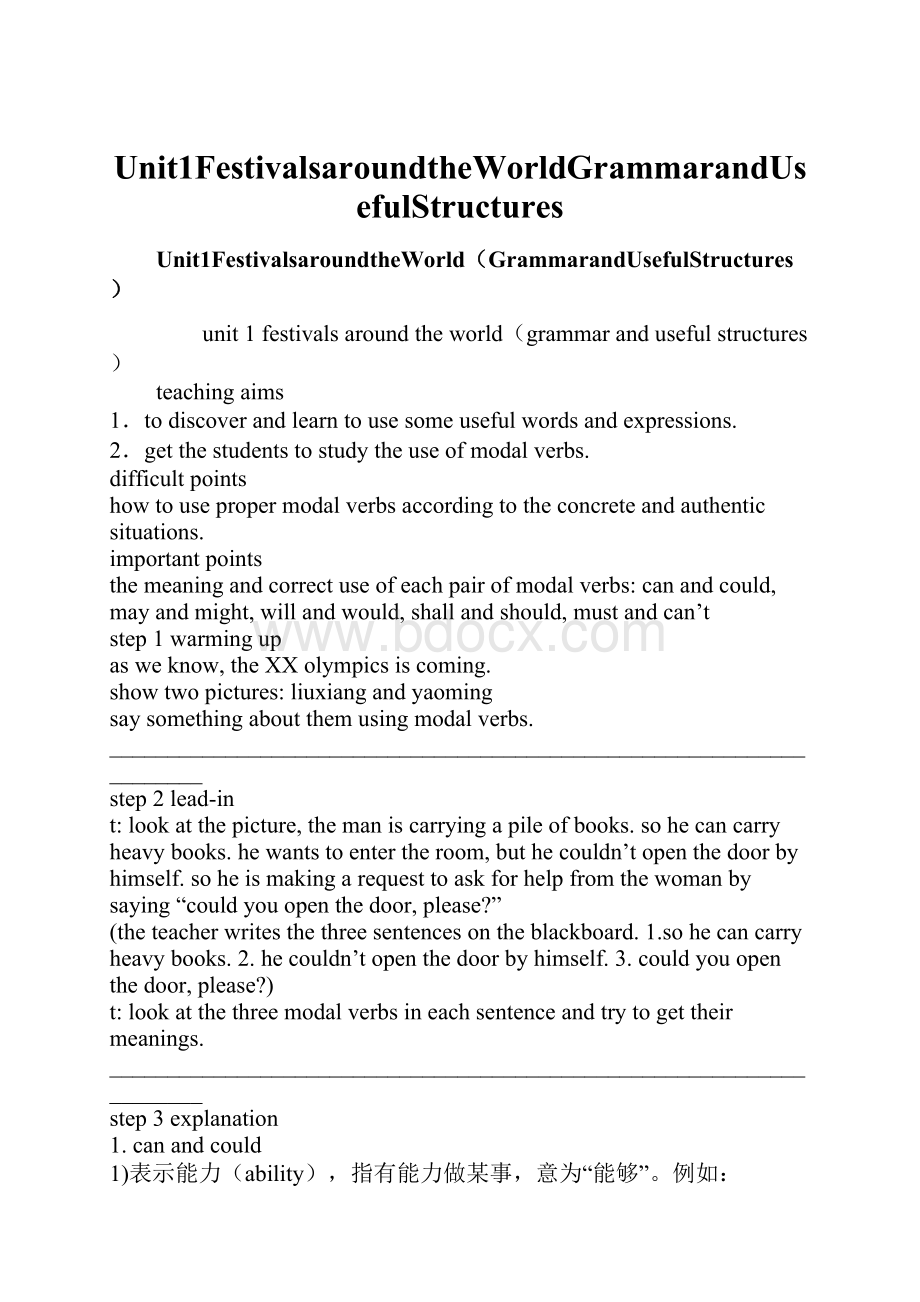Unit1FestivalsaroundtheWorldGrammarandUsefulStructures.docx
《Unit1FestivalsaroundtheWorldGrammarandUsefulStructures.docx》由会员分享,可在线阅读,更多相关《Unit1FestivalsaroundtheWorldGrammarandUsefulStructures.docx(6页珍藏版)》请在冰豆网上搜索。

Unit1FestivalsaroundtheWorldGrammarandUsefulStructures
Unit1FestivalsaroundtheWorld(GrammarandUsefulStructures)
unit1festivalsaroundtheworld(grammarandusefulstructures)
teachingaims
1.todiscoverandlearntousesomeusefulwordsandexpressions.
2.getthestudentstostudytheuseofmodalverbs.
difficultpoints
howtousepropermodalverbsaccordingtotheconcreteandauthenticsituations.
importantpoints
themeaningandcorrectuseofeachpairofmodalverbs:
canandcould,mayandmight,willandwould,shallandshould,mustandcan’t
step1warmingup
asweknow,theXXolympicsiscoming.
showtwopictures:
liuxiangandyaoming
saysomethingaboutthemusingmodalverbs.
____________________________________________________________________
step2lead-in
t:
lookatthepicture,themaniscarryingapileofbooks.sohecancarryheavybooks.hewantstoentertheroom,buthecouldn’topenthedoorbyhimself.soheismakingarequesttoaskforhelpfromthewomanbysaying“couldyouopenthedoor,please?
”
(theteacherwritesthethreesentencesontheblackboard.1.sohecancarryheavybooks.2.hecouldn’topenthedoorbyhimself.3.couldyouopenthedoor,please?
)
t:
lookatthethreemodalverbsineachsentenceandtrytogettheirmeanings.
____________________________________________________________________
step3explanation
1.canandcould
1)表示能力(ability),指有能力做某事,意为“能够”。
例如:
注意:
表示现在,将来“能够”可用beableto替换。
表示过去“能够”并成功了只能用was/wereableto,不能用could。
例如
mygrandmaisovereighty,butshecan/isabletoreadwithoutglasses.
wecan/willbeabletotalkaboutthematterlater.
italkedwithherforalongtime,andatlastiwasabletomakeherbelieveme.(不能用could)
2)表示请求(request)或允许(permission)。
意为“可否”、“可以”。
could比can更有礼貌,在此不是can的过去式。
canyouwaitamomentplease?
liz,canyoudomeafavor?
excuseme,couldyoutellmethewaytothestation?
iwonderifyoucouldhelpme.(request)
----couldiuseyourphone?
----yes,ofcourse.youcan.
doyouthinkicouldborrowyourbike.(permission)
3)表示可能性(possibility)
a.can表示泛指的“可能”,并非说话者主观认为的可能性,即并非说话者的主观猜测。
accidentcanhappentoanydrunkendriver
b.表示说话者主观猜测,只能用与否定句或疑问句中。
例如:
itcan’tbemyfather.heisnowinengland.
----canitraintomorrow?
----no,itcan’t.
2.mayandmight
1)表示可能性(possibility),用于对现在,过去或将来的推测,暗示不确定。
might不是may的过去式,它所表示的可能性比may小,含较多的怀疑。
共4页,当前第1页1234
hemaybeverybusynow.(可能性较大)
hemightbeverybusynow.(可能性较小)
2)表示许可(permission),表示允许别人做某事,也可征求对方的许可。
hemaygonow.
wemaykeepthebookfortwoweeks.
3)用于祈使句,表示祝愿。
mayyousucceed!
mayyouhaveanicetrip!
3.willandwould
1)表示意愿
表示愿意做或主动提出做,如意志,愿望或决心等,例如:
thatbaglooksheavy,i’llhelpyouwithit.(offeringtodosth)
----youknowthatbookilentyou.canihaveitbackifyou’vefinishedwithit?
----ofcourse..i’llgiveittoyouthisafternoon.(agreement)
thanksforlendingmethemoney,i’llpayyoubackonfriday.(promise)
2)表示习惯(habit,custom)
thisoldmanisstrange.hewillsitforhourswithoutsayinganything.
wewouldsitaroundgrandpaaftersupper,listeningtohisstories.
3)表示请求(request),用于第二人称,would比will更委婉。
例如:
willyoucomethisway,please?
wouldyouopenthewindow?
4.shallandshould
1)shall的用法
a.shall在疑问句中用于第一,第三人称,表示征求对方的意见。
shallweputoffthesportsmeetinguntilnextmonth?
shalltomgotherewithmetomorrow?
b.shall用于第二,第三人称,表示说话人给对方的命令,警告,允诺或威胁。
youshallfailifyoudon’tworkharder.(警告)
heshallhavethebookwhenifinishreadingit.(允诺)
heshallbepunished.(威胁)
2)should的用法
a.should表示劝告、建议、命令。
youshouldgotoclassrightaway.
b.should表示期待,用于表达合理推断(prediction,意为“应该”),或明显的结果(意为“可能”)且所期待的事几乎是事实。
itisthreeo’clock,thefootballgameshouldbeginnow.
marytookdancinglessonsforyears,sheshouldbeanexcellentdancer.
5.must与can’t
must用来表示“命令”、“推测”等含义。
1)表示规定、指令
表示规定、指令时主要指客观上的法律、条文规定,常常翻译为“应该、必须”之类意思。
mustn’t表示禁止
youmusthaveapassportifyouwanttogoabroad.
driversmustn’tdriveafterdrinking.
2)表示主观的命令、禁止
表示主观的命令、禁止时,主要指说话者主观的命令或强烈的劝告。
youcangooutwithyourfriendbutyoumustcomebackbefore11atnight.
----mustihandintheexercisetoday?
----no,youneedn’t.
3)表示猜测,语气非常肯定,近乎确定的意味,一般用于肯定句,意为肯定……。
其否定为can’t,意为不可能…...
youmustbeill.icanseeitfromyourface.
hecan’tbeathome.isawhimintheclassroomjustnow.
step4summingup
fromthedemonstrationofthemodalverbsabove,wecanfindmostofthemcanbeusedtoexpresscertainty,butthedegreeofthemisdifferent.共4页,当前第2页1234
hemightbeintheclassroom.(quitenotsure)
hemaybeintheclassroom.
hecouldbeintheclassroom.
heshouldbeintheclassroom.
hemustbeintheclassroom.(quitesure)
step5practice
1)findallthesentenceswithmodalverbsandexplainthemeaning.
1.othercelebrationswereheldwhenhunterscouldcatchanimals.
2.theylitfiresandmademusicbecausetheythoughtthesefestivalswouldbringayearofplenty.
3.…orsatisfyandpleasetheancestors,whocouldreturneithertohelportodoharm.
4.injapanthefestivaliscalledobon,whenpeopleshouldgotocleanthegravesandlightincenseinmemoryoftheirancestors.
5.onthisimportantfeastday,peoplemighteatfoodintheshapeofskulls,andcakeswith“bones”onthem.
6.itisnowachildren’sfestival,whentheycangototheirneighbours’homesandaskforsweets.
7.iftheyarenotgivenanything,thechildrenmightplayatrick.
8.somepeoplemightwinawardsfortheiranimals,flowers,fruitandvegetables,…
9.atthespringfestivalinchina,people…andmaygivechildrenluckymoneyinredpaper.
10.theymightincludeparades,dancinginthestreetsdayandnight.
2)completethefollowingsentenceswithpropermodalverbs.
a)you’vebeenworkingallday.you______beverytired.
b)(thedoorbellrings)iwonderwhothatis,it________belisa.she’sstillinthelibraryatthistime.
c)itisalongtimesincewemetlasttime.you________comeandseeusmoreoften.
d)ihaven’t;decidedwherei’mgoingformyholidays.i______gotoaustralia.
e)myfather’sbirthdayiscoming.what________igethim
f)whydon’tyoutryonthisdress?
it__________lookniceonyou.
g)“whowasthemantalkingwithyourteacher?
”“i’mnotsure.it___________beherbrother.
h)idon’tknowwhentheguests___________behere.they__________arriveatanytime.
(must,can’t,should,may,shall,will,might,will,could)
3)finishthedialogueusingmodalverbsonp6
1.a:
wouldyouliketogotoaspecialeventwithusonsaturday?
b:
yes,i’dliketogowithyouonsaturday2.a:
couldxiaofengfindtheoriginofeasterfromthatbook?
b:
no,hecouldn’tfindit.3.a:
mayigowithmyfriendtotheharvestfestival?
b:
yes,youmaygo(withyourfriends)4.a:
ifiwanttobeadoctorshouldistudyscience?
共4页,当前第3页1234
b:
yes,youshouldstudyscience.a:
heisveryhandsome.canheplaytheroleoftheprince
b:
no,hecan’tplaytheroleoftheprince.6.a:
theneighbor’schildrenareolderthisyear.mightorshouldtheystopplayingtricksathalloween?
b:
perhaps,theymightstopplayingtricksathalloweenorshouldstopplaying
4)makeadialogueusingmodalverbsaccordingtothegivensituation.
youhavetogotobuyfoodandgiftsforspringfestival.inpairs,oneastheshopkeeperandtheotherasthecustomer,offerandrequesttheitemsyouneed.usetheseexpressionstohelpyou.
wouldyoulike…?
couldihave…?
mightisuggest…?
mayisee…?
youshouldtry…?
couldwelookat…?
canyousee…?
wemighttake…?
homework
chooseoneofthefollowingsituationstocreateashortdialogueusingmodalverbs.
situationa:
inalibrary.askthelibrarianifhecanhelptofindabookrelatingtosomespecifictopics,whethertheycanberenewedornot,andhowtodoifthebooksarelost.(“couldyoupleasefind…?
”“mayi…?
”“youmustn’t…”)
situationb:
adoctorgivesapatientsomeadvice.(“youshould…”)
situationc:
inaparkbyalake.discussthatoneshouldnotdestroytheenvironment.(“youshould…”,“youshouldn’t…”,“youmustn’t…”)
situationd:
requestinganappointment.(“willyou…?
”“shalli…?
”)